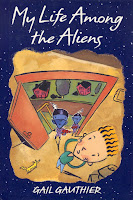While putting together the second post for October's book releases, I discovered that author Rajani LaRocca was having a book launch last week for her new picture book, Seven Golden Rings. You all know that when a virtual book event catches my fancy, I am in. So I did, indeed, register to attend. And showed up on time.
This was an excellent event on a couple of different levels.
As A Virtual Book Launch
Zoom event vs. webinar. Another book launch I attended this past summer was a traditional Zoom event, with the people attending showing up in the Zoom boxes a la
The Brady Bunch. However, the
Seven Golden Rings event, as a staff member from the bookstore sponsoring the launch (
The Silver Unicorn Bookstore in Acton, Mass.) explained, was a webinar. The people running it could not see or hear the attendees, nor could any of us see or hear anyone else.
This means, folks, that not only did I not have to dress up for this thing, I could have washed my hair and sat there with it drying, as I would have if I'd known how this was going to go down. Seriously, not only do I not want to have to drive to go anywhere ever again, I don't want to have to get dressed or comb my hair while I'm taking part in it from home.
By the way, 100 people registered to attend. By a few minutes after 7, when the show got on the road, 60 of us had shown up. More could have come later. But, you know, 60 people. Good work.
Interviewer and interviewee. So the bookstore staff person turned everything over to LaRocca, who was seated in what looked to be a whole lot better home office than I have, and the person who was going to interview her, author Hayley Barrett, who was somewhere else, since we're in the midst of a pandemic and all. Barrett and LaRocca are critique partners and have known each other for some time. A situation like that has the potential to go really badly, with all kinds of inside jokes and drifting off to their shared interests that listeners couldn't care less about. But au contraire. Barrett had the inside dope on what happened while this book was being written and knew just what to ask to get that information out.
The reading. LaRocca did a reading of the book. She did not just awkwardly hold the book open in front of a camera and turn the pages. She had her book loaded onto some kind of techie thing that kept it open and turned the pages. I don't know what it was, but it was terrific.
A surprise guest. LaRocca's son turned up, coming to us from his dorm room. It made sense why he was there. I once had two college-age boys. They are terrific, too.
A model. I think this was an excellent model for how a virtual book launch can operate so it isn't just the author talking. Bring in your own, prepared interviewer. Have some good technology. Bring in a guest.
As Exposure To A Lovely Book
I have now actually read Seven Golden Rings while it was being read to me by its author and have seen every page. It's a terrific story centering around a math/logic issue that I was actually able to understand. The illustrations by Archana Sreenivasan are wonderful. It's very, very possible that someone in my family is going to receive a copy of this book for Christmas. I will then share with him all the insider info I have about it, because I attended this book launch.


























